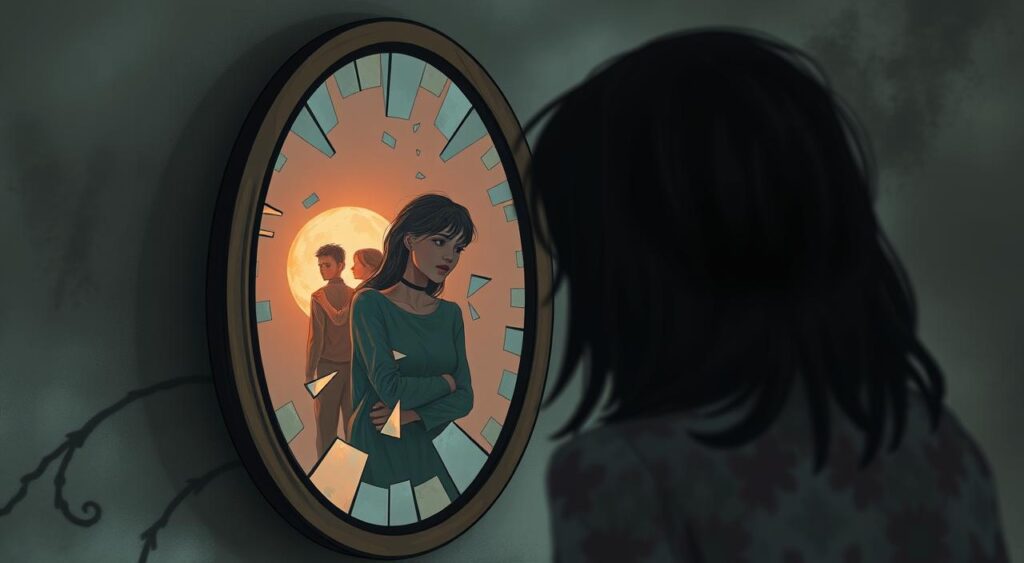Dealing with intimate relationships can sometimes lead us into complex situations. We might find ourselves with both partners showing signs of narcissistic personality disorder. This mix can make the relationship toxic and hard to understand, affecting our views on love and support1.
This article will look into the special problems of being in a relationship with two narcissists. We’ll talk about the emotional abuse, how it affects kids, and how to deal with it. We’ll also cover getting professional help and going through a divorce1. Let’s know what can happen when husband and wife are both narcissistic.
Key Takeaways
- Narcissistic personality disorder is marked by an exaggerated sense of self-importance and a lack of empathy for others.
- Having both partners in a relationship as narcissists leads to a toxic and dysfunctional dynamic.
- Common tactics in these relationships include gaslighting and manipulation.
- Children often suffer from emotional neglect and poor role models in such environments.
- Getting professional help and dealing with a narcissistic ex during a divorce are tough but important steps.
Understanding Narcissistic Personality Disorder
Narcissistic personality disorder is a mental health issue marked by grandiose behavior and a need for admiration1. People with this disorder believe they are better than others and always want attention and praise1.
Key Traits of Narcissism
Key traits of narcissism are being self-centered, thinking highly of oneself, and not caring about others’ feelings1. They expect special treatment and get upset if their high self-image is questioned1.
Lack of Empathy and Grandiose Behavior
Narcissists have trouble understanding others’ emotions, leading to poor relationships1. Their high self-regard and belief in their superiority make it hard for them to see others’ viewpoints1.
“Narcissists often display a grandiose sense of self-importance, a belief that they are superior to others, and a constant need for attention and validation.”
Toxic Dynamics in a Narcissistic Relationship
When both partners in a relationship are narcissists, it creates a toxic and dysfunctional dynamic. They often compete and always want to be the center of attention2. This leads to emotional abuse, manipulation, and a lack of emotional support and intimacy2.
Children in these families may face emotional neglect and unhealthy role models2. Narcissists focus on their own needs, leaving their kids without empathy and emotional support2.
Narcissists always need validation and admiration2. They may brag, refuse help, and complain about not being recognized. This is all to get the respect and admiration they want2.
| Trait | Description |
|---|---|
| Grandiose Behavior | Narcissists often show entitlement, arrogance, and think they are better than others. They believe they deserve special treatment. |
| Lack of Empathy | Narcissists find it hard to understand others’ feelings and needs. They put their own desires first, hurting their partners or family. |
Knowing the signs of a toxic relationship and narcissistic personality traits helps people in these situations. They can start to fix the problems and aim for a healthier relationship2. Understanding these dynamics helps protect people from the emotional abuse and manipulation in narcissistic relationships2.
“Narcissists are often locked in a cycle of competition, one-upmanship, and a constant need to be the center of attention, which can lead to emotional abuse and manipulation.”
Husband and Wife Are Both Narcissistic
In a relationship with both partners narcissistic, the focus is on their own needs. This self-absorption3 leads to a lack of emotional support. Studies show that in such marriages, the divorce rate is higher than in marriages with only one narcissistic spouse.1
The need for constant attention can create a codependent dynamic. Each partner depends on the other for their self-worth. Yet, they can’t truly meet each other’s emotional needs.
Research shows that narcissism is linked to lower marital satisfaction and more conflict when both partners are narcissistic.1 This self-absorption and lack of emotional support3 harm the relationship’s health and longevity. Therapy is less successful when both spouses are narcissistic, with less improvement in communication and relationship dynamics1.
Those with narcissistic traits often act in ways that hurt the relationship, especially if both partners do this1. The need for constant validation and poor empathy leads to a cycle of conflict and emotional neglect.

Dealing with a relationship where both are narcissistic is complex. A survey of therapists found that working with such couples is challenging, often leading to early treatment end.1 Yet, with the right support and strategies, it’s possible to overcome self-absorption and codependency. This can lead to a healthier, more fulfilling relationship.
Emotional Abuse Tactics Used by Narcissists
Narcissists use many emotional abuse tactics to keep control in their relationships. One key tactic is gaslighting4. They make the victim doubt their own reality and memories. They also use manipulation4. This includes acting like a victim or using the other’s weaknesses to get what they want.
Gaslighting and Manipulation
Gaslighting makes the victim doubt their own experiences. The narcissist denies or distorts what happened, causing confusion and anxiety4. This can make the victim question their own identity. Manipulation is when the narcissist uses the victim’s weaknesses to their benefit4.
Together, gaslighting and manipulation keep the narcissist in control. The victim feels powerless and trapped4. Knowing about these tactics helps victims recognize abuse and gain back their freedom.

“The narcissist’s goal is to make you feel so confused and insecure that you look to them for the truth, when in reality, they are the ones distorting it.” – Unknown
Recognizing emotional abuse signs, like social isolation and constant criticism, is key4. Victims can start to break free and get the help they need to heal.
| Emotional Abuse Tactic | Description |
|---|---|
| Gaslighting | Systematically undermining the victim’s reality and making them question their own perceptions and memories. |
| Manipulation | Exploiting the victim’s vulnerabilities, playing on their emotions, and twisting the narrative to the narcissist’s advantage. |
Codependency in Narcissistic Relationships
Codependency often happens in narcissistic relationships. Because narcissists have a fragile sense of self, they often rely on their partners for emotional support. At the same time, they devalue and use their partners2. This leads to a cycle of needing each other emotionally, controlling each other, and lacking real closeness and support.
In these relationships, the narcissist might act like a martyr. They sacrifice themselves but want praise from others2. People with this trait put their partner’s needs before their own. They act like victims and show signs of codependency2. This behavior comes from low self-esteem, past experiences, and a need for approval through sacrificing themselves2.
The person in the relationship with the narcissist may become emotionally and financially tied to them. They can’t escape the abuse cycle. This leads to a big loss of self-worth. The person becomes more submissive and can’t stand up for their own needs and limits.

It’s important to know the signs of codependency and why it happens in these relationships. Getting help from professionals, like couples therapy, is key. It gives the tools and support needed to leave this harmful cycle. It helps build better, more satisfying relationships5.
Impact on Children in the Family
Children in narcissistic families face a big challenge. Their parents often focus more on themselves than on their kids’ feelings. This leads to emotional neglect and dysfunctional role models6.
Kids may struggle to feel good about themselves. They might not get the emotional support they need. Over time, they learn to adapt, but this can hurt their natural strength6. Some kids bounce back well, but the stress can affect them later in life6.
These kids might pick up bad ways to deal with stress. They could start acting narcissistic or codependent. They might try to handle the stress by doing different things, standing up to the problem, or finding support6.
Childhood trauma isn’t just about extreme abuse or neglect6. It can include seeing violence, being bullied, losing someone close, or living in a chaotic home6. This trauma can affect their health, relationships, and happiness as adults6.
Not every child will get PTSD or C-PTSD from trauma. Their response depends on their age and support system6. But, the effects of growing up in a narcissistic family can be big and long-lasting. They need special help and support6.
“Children who grow up in narcissistic families often struggle with a deep sense of emptiness, a lack of self-worth, and a profound sense of loneliness, even when surrounded by people.” – Dr. Elinor Greenberg, author of “Borderline, Narcissistic, and Schizoid Adaptations: The Pursuit of Love, Admiration, and Safety”

| Characteristic | Description |
|---|---|
| Emotional Neglect | Narcissistic parents often fail to provide the emotional support, validation, and healthy emotional development their children need. |
| Dysfunctional Role Models | Children in narcissistic families are exposed to unhealthy behaviors and coping mechanisms, leading to the development of their own narcissistic or codependent tendencies. |
| Lasting Impact | The effects of growing up in a narcissistic family can extend into adulthood, affecting mental health, physical health, relationships, and overall well-being. |
Seeking Professional Help
Getting help from professionals is key for those dealing with narcissists or coming from narcissistic families. Therapy offers a safe space to work through feelings and learn coping skills. It helps understand the complex dynamics at play. Therapists skilled in narcissistic abuse support and guide on setting boundaries and healing7.
Importance of Therapy for Narcissistic Abuse
Dealing with a narcissist can be draining and traumatic. Seeking professional counseling is vital for those who’ve faced narcissistic abuse. It helps them deal with the emotional and psychological effects. A therapist can teach coping skills, help rebuild self-esteem, and set boundaries for protection7.
Counseling offers a supportive place to share experiences and understand narcissistic personality disorder. It teaches strategies for dealing with the unique challenges faced. By seeking mental health resources and therapy for narcissistic abuse, survivors can move towards healing and finding their self again7.
“Therapy can be a transformative experience for those who have endured narcissistic abuse. It provides a safe haven to confront the past, develop coping skills, and ultimately, find the path to recovery and renewed empowerment.”
Recovering from narcissistic abuse is tough, but with a skilled therapist and self-care, people can escape the abuse cycle. Seeking professional help is brave and essential for healing and growth7.
When One Partner Wants to Change
In some cases, one partner in a narcissistic relationship may see the need for change and try to improve. This can be hard, as narcissists often don’t see their own flaws1. If one partner seeks help and truly wants to change, it might help the relationship. But, this change is hard and takes a lot of time1.
It’s tough for the non-narcissistic partner, who has likely faced a lot of emotional hurt1. Both partners must be fully committed to change. The narcissistic partner must face their actions and how they’ve hurt the relationship1. This means a lot of therapy, thinking deeply, and wanting to change old habits1.
But, success is not sure1. Narcissists might find it hard to keep improving. The non-narcissistic partner might wonder if staying or leaving is better1. Getting help from a mental health expert is key in making these tough choices1.
Choosing to stay or leave a narcissistic relationship is a big decision. It’s important to think about your own safety and well-being8. By working on yourself, you can handle life’s changes better8.
Navigating Divorce with a Narcissistic Ex
Getting a divorce from a narcissist is tough and emotionally draining. They often don’t want to give up control and may use the divorce to manipulate and abuse you more 1. It’s key to get legal advice and set strong boundaries to protect yourself. This includes avoiding their tricks like gaslighting, financial abuse, and trying to turn your kids against you .
Protecting Yourself from Further Manipulation
Being clear and strong, and getting help from professionals, can make dealing with a narcissistic ex easier . Experts say it’s vital to focus on healing and growing after the divorce. This means reflecting on yourself, setting limits, and taking care of your emotional health .
- Get legal help to protect your rights and fight off the narcissist’s divorce tricks.
- Set clear limits and speak up firmly, don’t play their emotional games.
- Do things that help you feel good, like therapy, meditation, or writing in a journal, to build up your emotional strength.
- Try to limit contact with your narcissistic ex as much as you can to avoid their abuse.
- Build a strong circle of friends and family who can support you emotionally and practically during this tough time.
Dealing with a narcissistic ex in divorce is tough, but with professional support, setting boundaries, and caring for yourself, you can stay safe from more manipulation and abuse.9
“The journey of healing and growth after a divorce with a narcissistic ex is not easy, but it’s crucial for taking back your power and creating a healthier future.”
Conclusion
Dealing with a narcissistic relationship is tough. It often involves emotional abuse, manipulation, and a lack of real closeness and support. But, by understanding the issues and getting professional help, you can lessen its effects and start healing.
Putting your well-being first and using coping strategies like building emotional strength8 are key. These steps help you get through the hard times in a relationship with narcissistic traits.
It’s important to set clear boundaries, show empathy, and aim for mutual respect and emotional bonding. These are often missing in such relationships10. Getting help for mental health issues, like depression10, with therapies like CBT and behavioral activation10, can make a big difference.
Healing and moving on is hard, but with the right support8, dedication, and self-care, you can come out stronger and more resilient8. You’ll be ready to form healthier relationships that match your values and needs.
FAQ
What is narcissistic personality disorder?
This disorder makes someone think they are more important than others. They don’t care much about others’ feelings. They always want lots of praise.
What are the key traits of narcissism?
People with narcissism think they are better than others. They always need to be the center of attention. They find it hard to understand others’ feelings.
What are the unique challenges of a relationship where both spouses are narcissists?
Such relationships are very toxic. Both partners compete and always want to be in the spotlight. This leads to emotional abuse and no real support or closeness.
How does self-absorption and lack of emotional support impact a relationship with two narcissistic partners?
Both partners focus on themselves too much. They don’t support each other emotionally. They need constant attention and praise, making them dependent on each other but not truly fulfilling each other’s needs.
What are some common emotional abuse tactics used by narcissists?
They often make their partners doubt their own thoughts and memories. They might act like victims or use others’ weaknesses to control the relationship.
How does codependency manifest in a relationship with two narcissistic partners?
Both partners rely too much on each other for their self-worth. They value and use each other, leading to a cycle of neediness and lack of real closeness.
What is the impact on children in a family where both parents are narcissists?
Kids grow up feeling ignored and learning bad ways of relating. Parents focus on themselves, leaving kids without emotional support or healthy ways to deal with feelings.
Why is seeking professional help important for individuals in a relationship with a narcissist?
Getting help is key for those with narcissistic partners or from narcissistic families. Therapy offers a safe place to deal with abuse and learn how to cope, understanding the relationship dynamics better.
What challenges may arise if one partner in a narcissistic relationship tries to change?
Trying to change can be hard and slow. The narcissist might not want to change, making it tough to improve the relationship.
What should be considered when navigating a divorce with a narcissistic ex?
Divorcing a narcissist is hard and emotionally draining. They might try to control and manipulate you during the divorce. Always get legal advice and set clear boundaries to protect yourself.
Source Links
- Treatment Resistance and the Therapist’s Shame – https://www.psychologytoday.com/sg/blog/perfectionism/202409/treatment-resistance-and-the-therapists-shame
- Martyr Complex: The Cost of Seeking Validation Through Sacrifice – https://www.psychologs.com/martyr-complex-the-cost-of-seeking-validation-through-sacrifice/
- Wistoria: Wand and Sword: New Team, New Enemies – https://gamerant.com/wistoria-wand-and-sword-episode-8-review/
- How to Recognize an Abusive Relationship and Seek Help – https://bayareacbtcenter.com/how-to-recognize-an-abusive-relationship-and-seek-help/
- Couples Counseling in San Francisco: A Comprehensive Guide – https://bayareacbtcenter.com/couples-counseling-in-san-francisco-a-comprehensive-guide/
- Navigating Childhood Trauma: Fact vs. Fiction – https://www.psychologytoday.com/za/blog/traumatization-and-its-aftermath/202409/navigating-childhood-trauma-fact-vs-fiction
- Passion for a Politically Dissimilar Partner: Can It Work? – https://www.psychologytoday.com/ie/blog/why-bad-looks-good/202409/passion-for-a-politically-dissimilar-partner-can-it-work
- Navigating Life Transitions: Turning Change Into Opportunity – https://www.psychologytoday.com/nz/blog/the-discomfort-zone/202409/navigating-life-transitions-turning-change-into-opportunity
- When Your Ex Becomes the Person You Always Wanted – https://www.psychologytoday.com/nz/blog/the-power-of-parallels/202409/when-your-ex-becomes-the-person-you-always-wanted
- Healthy Aging: The Crucial Role of Mental Health – https://www.psychologytoday.com/nz/blog/advancing-psychiatry/202409/healthy-aging-the-crucial-role-of-mental-health







